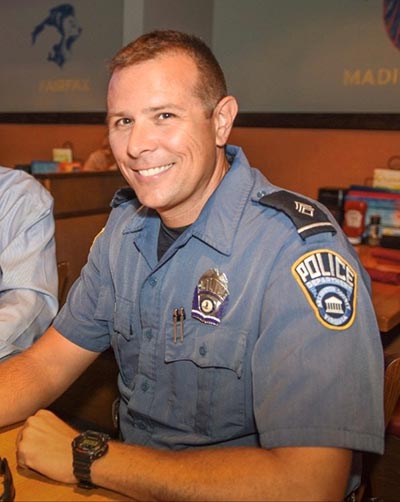Contact Us
To provide feedback on the Community Policing Dispatch, e-mail the editorial board at CPDispatch@usdoj.gov.
To obtain details on COPS Office programs, publications, and resources, contact the COPS Office Response Center at 800-421-6770 or AskCopsRC@usdoj.gov

U.S. Department of Justice
Office of Community Oriented Policing Services
Washington, DC 20530
A vibrant nightlife is a plus for many communities—adding to the local economy, attracting new residents, and raising real estate values. But it has its drawbacks too, especially when hearty partiers have overindulged in alcohol. The consequences can include drunk driving, assaults, property damage, and undesirable public behavior.
Response to this problem traditionally falls to law enforcement alone, and often requires officers working overtime details, which can stretch the department’s staff and budget thin. But in Arlington, Virginia, local law enforcement is getting a helping hand from establishments that serve alcohol.
A Collaborative Community Policing Program
 Known as the Arlington Restaurant Initiative (ARI), it’s a collaborative community policing program started by the Arlington County Police Department (ACPD) in partnership with county agencies and local restaurants. Its goal is to encourage the adoption of best practices for alcohol service, public safety, food safety, and fire and zoning compliance by local restaurants.
Known as the Arlington Restaurant Initiative (ARI), it’s a collaborative community policing program started by the Arlington County Police Department (ACPD) in partnership with county agencies and local restaurants. Its goal is to encourage the adoption of best practices for alcohol service, public safety, food safety, and fire and zoning compliance by local restaurants.
And since it was launched in February 2018, it has significantly improved not only the safety and overall quality of life in and around participating restaurants, but the department’s relationships with the business owners and community. This has been especially true in Clarendon, a neighborhood in Arlington County, Virginia, where ARI was first implemented.
Located just three miles from Washington, D.C., Clarendon is home to about 15 restaurants, all of which have thriving bar scenes, attracting as many as 7,000 young people from all over the area on weekend nights.
Reducing Costs and Overtime Shifts
 To handle crowd control and alcohol related violations, ACPD had to create a supplemental overtime detail which eventually grew to 20 officers. In addition to the cost of overtime pay, the officers on nightlife detail, which mostly involved arresting drunks and breaking up fights from 9 p.m. until 3 a.m., were suffering from duty fatigue.
To handle crowd control and alcohol related violations, ACPD had to create a supplemental overtime detail which eventually grew to 20 officers. In addition to the cost of overtime pay, the officers on nightlife detail, which mostly involved arresting drunks and breaking up fights from 9 p.m. until 3 a.m., were suffering from duty fatigue.
“We knew we had reached a tipping point,” says ACPD Master Police Officer Jim Mastoras. “The officers had developed negative feelings, and so had the restaurant owners who felt that our enforcement activities, and even just our presence alone, was hurting business. So I searched for a better way, something that would bring all the affected parties together in a mutually satisfactory solution.”
Searching online, Mastoras discovered The Best Bar None, a United Kingdom-based initiative designed to promote responsible management of alcohol-licensed premises. “I described it to a COPS Office staffer I met, and told him I’d like to replicate it. He was equally enthusiastic and said to run with it.” ACPD Chief Jay Farr was supportive too, and the program was launched in partnership with Arlington County government agencies.
How ARI Works
Like Best Bar None, ARI is a voluntary accreditation program which recognizes establishments that are committed to responsible alcohol management. It provides a wide range of resources and staff training to restaurants that participate and agree to maintain the policies and standards set out in the ARI Accreditation Standards and Guide for Writing Policy.
Developed with input from local restaurant owners, these standards not only lower the incidence of undesirable behavior, but they also reduce the restaurant’s liability for violation of the state’s alcohol laws, property damage, and injuries related to drunken behavior.
To become accredited, restaurants must write and submit employee policies to meet ARI standards. These include procedures that prevent underage drinking; participation in the Bar Bystander program, which teaches staff how to safely intervene in violent or stalking incidents; and the establishment of criteria for calling the police.
The restaurant’s management and their serving and security staff must also participate in ARI training in subject areas including responsible alcohol service, fake identification detection, CPR, NARCAN training for preventing opioid overdose deaths, and other safety procedures.
Developing Personal Relationships is Key
Training Provided to ARI Participants
Police officers, fire marshals, Virginia Commonwealth attorneys, and other employees of Arlington County provide training to restaurant staff in such areas as the following:
- TiPS (Training for Intervention ProcedureS) to prevent intoxication, underage drinking, and drunk driving
- Responsible alcohol service
- Fake identification detection and deterrence
- De-escalation techniques
- Public safety expectations and procedures if a crime occurs
- Fire safety and occupancy
- CPR
- Bar Bystander Program, intervention training to reduce sexual and domestic assault
- Compliance with food safety regulations
- Active Shooter Training
- Working with zoning ordinances

The success of initiatives such as ARI, however, depends upon trust, communication, and personal relationships with the establishment’s owners and staff. Says Mastoras, who is the Restaurant Liaison Officer, “I was in Clarendon, visiting the establishments on a regular basis. They needed to know that I would be there for them [and] supportive in every way I could. And I told them that if they did participate and adhered to the standards, they would have fewer calls for service, which turned out to be true.”
Asked if there were any challenges to overcome, he admits that some owners refused to participate. “But I kept going back to them, and eventually they joined the program.” Another area of concern was training the officers to adopt a community policing approach and focus more on relationships than on enforcement.
“I said, ‘If you can have the same outcome without an arrest, use discretion. Also, try to have positive interactions early in the night so the good feelings will transfer to later in the evening.’ And since we started ARI, I have heard nothing but positive things from our officers. A number of them have established personal relationships with security staff and others who work in the restaurants, and have more job satisfaction as a result.”
Benefits to Restaurants, Visitors, Police, and the Community
There are big advantages for the restaurants, too. The training they receive not only improves service and safety for everybody in the restaurant, but also lessens their liability. Says Nadim Kouttab, General Manager of Whitlow’s on Wilson, “The training and services have been terrific. Among other things, my door staff learned how to spot fake IDs, which keeps us out of trouble.”
“I’ve been here 22 years,” Kouttab adds, “and never had a relationship this good with police and other agencies—like the fire department and county code enforcement. I have relationships with participating restaurants, too. We communicate regularly, giving each other a heads-up if there’s a group causing trouble, for instance. ARI has created a sense of community.”
Another benefit is that, like all other ARI-accredited restaurants, Kattoub’s establishment is promoted by the Arlington Office of Economic Development and the Chamber of Commerce. What’s more, by reducing disorderly conduct and crime, local nightlife is more attractive to visitors, which makes businesses better and the community happier.
As for the ACPD, they too have benefitted—from much-improved relations with the local businesses and residents, as well as fewer calls for service. And because the nightlife detail of 20 officers is now reduced to eight, there’s a financial benefit as well.
Replicable in any Community with an Active Nightlife
Wherever there are large numbers of people drinking, there is the danger of disorderly behavior, property damage, litter, noise, and violence. And though law enforcement will respond to these problems, dealing with rowdy drunks, making arrests for misdemeanors, and babysitting intoxicated individuals while they sober up is a detail no officer relishes. But by working with bars, restaurants, local government and other stakeholders, law enforcement can prevent many of these problems from occurring in the first place—making everybody happy.
Agencies interested in adopting a similar program can get more information on the ARI website, read The Arlington Restaurant Initiative: A Nightlife Policing Strategy to Improve Safety and Economic Viability, or listen to Stemming the Nightlife Crisis. The publication and podcast were developed by the COPS Office in collaboration with ACPD.
Faye ElkinsSr. Technical Writer
Subscribe to Email Updates
To sign up for monthly updates or to access your subscriber preferences, please enter your email address in the Subscribe box.






